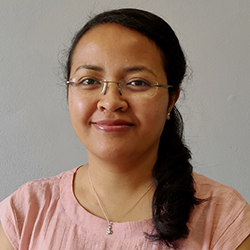UCT's FLAIR fellows 2020

Dr Rondrotiana Barimalala,

Historically, tropical cyclones that form on the south-eastern coast of Africa have been considered ‘too weak’ for inclusion in hazard planning. But with the catastrophic damage caused by cyclones Idai and Kenneth in 2019, it has become clear that these weather events are intensifying.
To understand what’s behind this change, Barimalala is investigating the role that ocean eddies, upper ocean temperature and salinity play in the occurrence of tropical cyclones in this region.
“For FLAIR, I will particularly focus on the role of the oceanic processes on tropical cyclone intensification in the Mozambique Channel,” she explains.
“The FLAIR fellowship will allow us to focus on developing our research and building our careers as independent researchers. It is also an opportunity to showcase the importance of science for the development of a country, which is usually significantly undermined in Africa.”
Dr Ross Blamey, Department of Oceanography

“Compared to other regions of the world, little is known about these storms in southern Africa, yet they are an important component of our climate system,” he says.
Through the FLAIR fellowship, he seeks to address this gap in African climate science using a combination of newly available observations and state-of-the art climate model output.
A better understanding of the present and projected future climate of this region will help address some of the complex socio-economic and environmental issues it faces in relation to water and food security.
Blamey adds that one of the exciting things about being a FLAIR fellow is having access to a network of other young African academics doing research that is relevant to the continent.